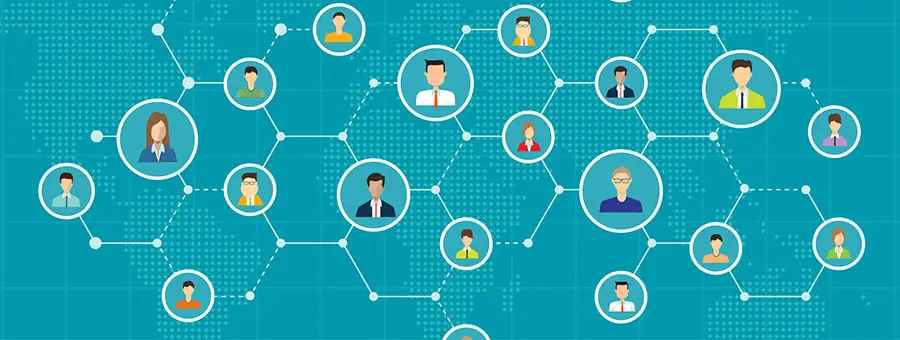
Networking involves establishing relationships with an individual, groups of people or organizations who can help advance your career or business in some way(s) . There are four elements in that, as noted:
- It’s about establishing relationships not just contact. Little will come from just contact and relationships take time and the building of trust.
- The relationships can be with individuals, groups of people or with organizations. They are different and have to be approached in different ways (e.g. a relationship will exist or won’t exist with an individual, but could exist with a group of people or organisation without their being contact with everyone involved but with some key people).
- The purposes can be for career or business or both.
- The purposes of the networking can vary.
For networking to be effective it’s important to first be clear the the purpose(s) and they could be:
- Brand promotion;
- Generate revenue;
- Generate referrals to others (either for business or to include in your network);
- Generate opportunities;
- Self development;
- Other?
It’s not necessary to be clear on the purpose(s) for each interaction (because anything could result) but it is important to know the fundamental purposes of why you are engaging networking itself.
Networks today can be bigger, wider geographically and more fast paced, and therefore can present greater opportunities.
The nature of networking today is more varied than before. It’s a lot more than catching up face to face or having a phone call. It’s digital … social media … facebook, linkedin, twitter, instagram. But just setting up accounts is unlikely to help. They have to be ‘worked’ from a well laid out plan. Face to face meetings and phone calls are still important, of course, but sometimes sourced from digital networking and therefore later in the process. (The business lunch, whilst not dead, is less prevalent).
Because networking involves more digital contact now, we need to be very careful to not say or ask for anything digitally that we wouldn’t face to face. That’s a real trap.
The use of email in networking can be very dangerous and needs to be skillfully handled, such as:
- Be careful of asking for something via email;
- Make sure the person you’re emailing knows exactly who you are early in the email;
- Ensure your emails can never be regarded as spam (or could go to spam);
- Keep emails brief and to the point.
Demonstrating that you want to learn from others is a most powerful method to effectively drive results from networking. People appreciate that type of genuine interest and intent, and are more likely to engage with you as a result.
It’s also important to understand that each person you meet ‘knows’ many others (probably hundreds) and that each interaction with someone is a potential interaction with someone else. So, there should always be a dual focus of an interaction … with the person and with the people they know.
Notwithstanding that everyone knows a lot of other people, some people have amazingly strong networks and contact with some like that should be a goal.
It’s a fact that some people will not be able to help you further your career or your business and that needs to be recognized. So, spending time with them is more social than networking.
Networking is not ‘net watching’. The number in your network is irrelevant .. it’s what you do with them that matters. You have to devote time to networking according to a plan.
It’s an effective (and personally sound) strategy to always offer help before ‘expecting’ it back … go first. It’s common for the return to far outweigh the help we give.
Be clear in how you represent yourself to your network … on your personal brand and don’t confuse your network. How do they perceive you?
Understand that benefiting from networking can take time. Trust and confidence has to be grown to benefit from contact from anyone … and that is driven by the frequency, duration and nature of your interactions with them.
Networking for career purposes should be happening whether you think you need to or not. You never know what’s around the corner (positively or negatively)! Never allow the possibility of being caught out for unforeseen events.
Networking should be both proactive (time per week or month) and reactive to opportunities as they arise (eyes and ears open).
There are many networking groups that exist and they can be highly effective if ‘worked’ properly … or you can start your own (people can be most enthusiastic inside new ventures).
Always play to your strengths (and keep away from your weaknesses) in networking. Trying to excel at an activity you are naturally weak at is less effective than sticking with what you are naturally talented in.
It’s highly beneficial (and necessary) to network outside of your own industry. The learning is broader and the contacts can lead to different outcomes. Related to that is to also network outside of business itself. There’s a lot to be learnt from people in non business roles or organisations.
It’s effective to target some specific people (or organisations) to include in your network … knowing how they could help you.
It’s often easiest to get introduced to someone you wish to meet through someone who already knows them. This should be part of your plan, sometimes.
Set about becoming known as someone who knows a lot, knows a lot of people and is willing to help others … not as a networker who wants things in return … there’s a skillful and effective difference.
Measuring the return on time spent on networking, whilst important, can be very difficult and ‘gut feel’ is sometimes unavoidable. And remembering that instant returns from any activity should not be expected so be careful of that in any measurement.
Finally, networking has to be enjoyable (most of the time). If it’s not then it will show and be less effective for you.
Previous Newsletter Articles
Business Tips
HR Information
Contact Us
1300 022 270
enquiries@myabbs.com.au






